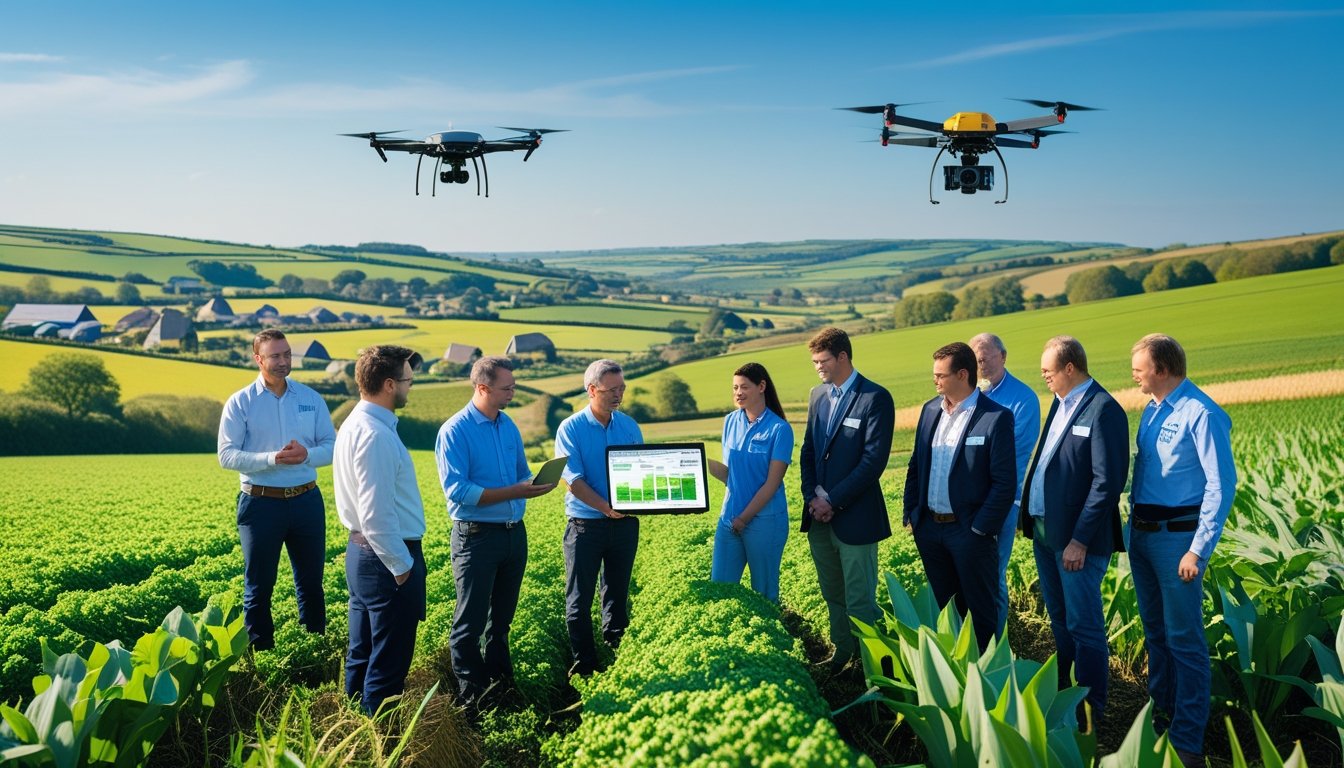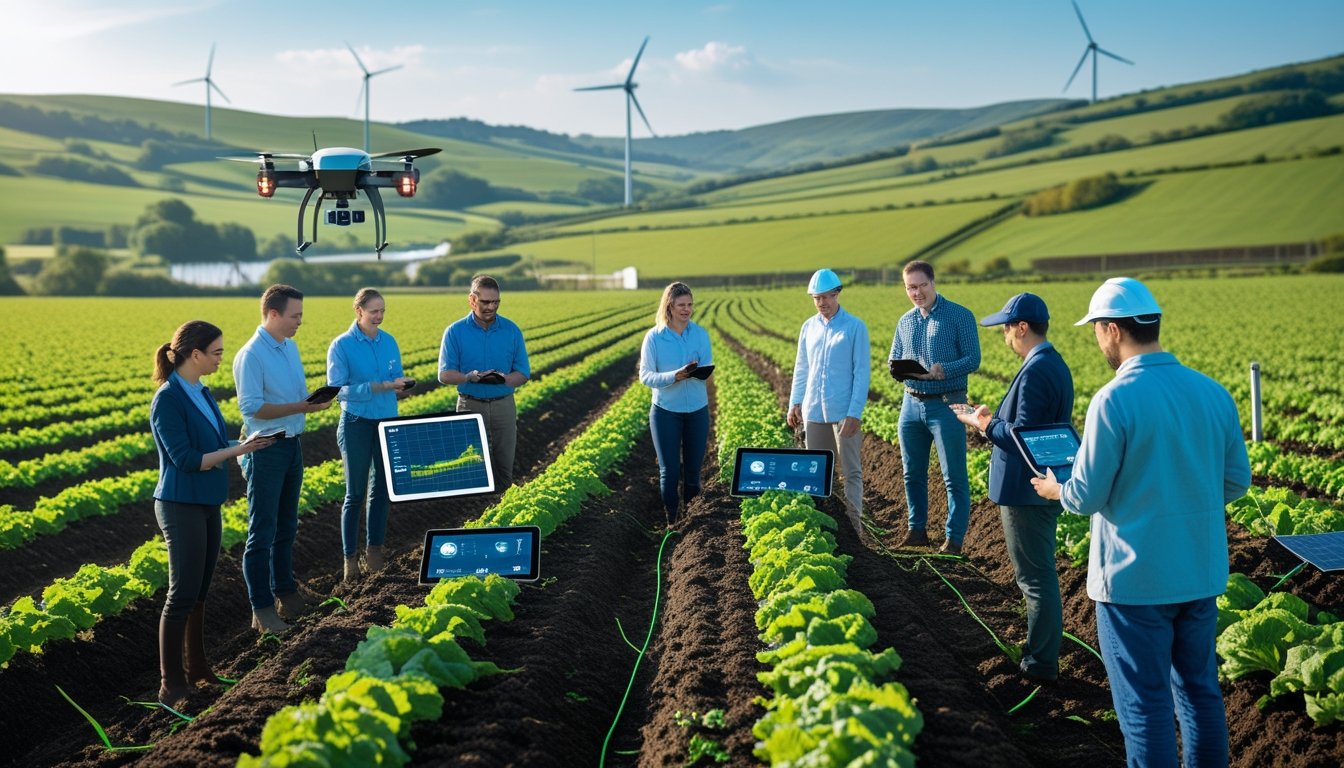Late updated: 10 Jun 2025 13:06
Written by: Oliver Bennett
Impact Of AI On Rural UK's Environmental Sustainability: A Closer Look at Green Innovations
The rural UK landscape is undergoing a fascinating transformation as artificial intelligence becomes a key player in enhancing environmental sustainability. AI-driven innovations are revolutionising farming practices, optimising transportation, and refining environmental monitoring, forging a path towards a more sustainable future. AI is not just bridging the urban-rural divide; it is enabling rural communities to thrive while preserving their natural surroundings.

As we explore the transformative effects of AI, we must also consider the opportunities and challenges it presents. Innovators and policymakers are hard at work to ensure these technologies are implemented effectively, enhancing productivity while respecting ecological boundaries. This balance is crucial for creating resilient, sustainable rural economies.
Our journey into this topic will delve into the significant shifts occurring in rural UK, exploring how AI continues to shape the landscape and lifestyle. Emerging AI technologies offer an exciting glimpse into a future where rural life is enhanced, offering both environmental and economic benefits.
Key Takeaways
- AI is transforming farming and environmental strategies in rural UK.
- Effective implementation of AI balances productivity with ecological respect.
- AI helps bridge the rural-urban divide through sustainable innovation.
Transformative Effects of AI on Rural UK's Environmental Sustainability
Our exploration of AI's transformative potential in rural UK's environmental sustainability focuses on three main areas: boosting agricultural productivity, advancing renewable energy management, and enhancing waste reduction and recycling systems. Each of these plays a vital role in creating a more sustainable and efficient rural environment.
Enhancing Agricultural Productivity with AI
AI technologies have revolutionised farming practices in rural UK. By employing precision agriculture, we can optimise crop yields through data-driven insights. AI systems utilise sensors and drones to monitor soil health, moisture levels, and crop conditions. Farmers can now make informed decisions swiftly, reducing resource wastage and boosting efficiency.
Another significant enhancement is predictive analytics for crop management. By analysing weather patterns and soil conditions, AI provides future insights that guide planting and harvesting times. These insights aid in improving productivity while minimising environmental impact.
AI also supports livestock management, enhancing animal welfare. Through behavioural analysis, farmers can understand their herds better, ensuring that health issues are promptly addressed.
Advancements in Renewable Energy Management
Renewable energy management in rural UK is greatly benefitted by AI integration. We are witnessing an increased efficiency in energy production and distribution. AI's predictive capabilities enable more accurate forecasts of energy demand and production, resulting in optimised energy flow and storage systems.
For wind and solar farms, AI assists by predicting weather conditions. This ensures optimal positioning and operation, enhancing energy yield. Furthermore, AI algorithms are used in grid management, allowing for real-time adjustments that match energy supply to local needs.
Energy consumption in remote areas is also addressed by AI applications, which promote energy-saving practices. Smart meters and AI-controlled devices lead to a significant reduction in energy waste, ensuring that rural areas become more sustainable and self-sufficient.
Improving Waste Reduction and Recycling Systems
In rural UK, AI contributes to robust waste management systems. By automating sorting processes, AI improves the efficiency of recycling facilities, ensuring more materials are properly dealt with. This reduces landfill dependency and promotes circular economies.
AI technologies are applied to waste collection systems, optimising routes and schedules. This minimises fuel consumption and carbon emissions, contributing to a reduced environmental footprint. Additionally, waste prediction models enhance local planning and responses to waste-related challenges.
Moreover, community recycling initiatives benefit from AI's educational tools. These tools inform and motivate households, increasing participation in recycling efforts and leading to more sustainable waste management practices across rural regions.
Opportunities and Challenges of AI Implementation in Rural Environmental Strategies

AI has the potential to transform environmental strategies in rural UK, offering innovative solutions to sustainability challenges. Yet, there are significant hurdles, from technological barriers to environmental risks that need addressing for successful AI integration.
Barriers to AI Adoption in Rural Communities
Rural areas often face significant obstacles in adopting AI technologies. One major barrier is the lack of infrastructure, such as reliable internet connectivity, which is vital for deploying AI systems. Additionally, there tends to be a shortage of technical expertise in rural communities, making it difficult to maintain and operate AI tools effectively.
Cultural resistance can further hinder implementation. Many rural residents are cautious or unfamiliar with new technologies, which can lead to reluctance in embracing AI-driven solutions. Furthermore, costs associated with AI technology can be prohibitive, especially for small rural enterprises not equipped to invest in advanced systems. These challenges necessitate targeted education and funding initiatives to support AI adoption.
Mitigating Environmental Risks Associated with AI Technologies
AI technologies, while beneficial, can pose environmental risks. Energy consumption is a prime concern, as AI systems often require significant power, potentially leading to increased carbon emissions. This is especially pertinent in rural areas, where renewable energy sources might not be readily available.
Additionally, AI applications might disturb local ecosystems if not carefully managed. For instance, autonomous farming equipment could inadvertently harm wildlife habitats. Addressing these risks involves developing environmentally friendly AI solutions and ensuring that their implementation is monitored and adjusted to minimise ecological impact. Collaborative efforts between developers, government, and local communities are essential to balance technological advancement with environmental stewardship.
Frequently Asked Questions

In rural UK environments, the integration of artificial intelligence significantly enhances sustainable practices. From improving agricultural efficiency to bolstering conservation efforts, AI is reshaping how we understand and manage environmental sustainability.
How is AI being utilised for environmental sustainability in rural parts of the UK?
AI is employed in the rural UK for precision agriculture, optimising water usage, and improving crop yield. These technologies reduce waste and resource consumption, contributing to more environmentally sustainable farming operations.
What role does artificial intelligence play in conservation efforts within the UK's rural environment?
Artificial intelligence assists conservation by monitoring biodiversity and habitat health. It enables rapid data analysis, helping conservationists track species populations and manage natural resources effectively. This ensures that conservation strategies are both effective and sustainable.
In what ways is AI integrated into environmental analysis for UK rural areas?
In rural areas, AI is utilised to analyse large datasets concerning soil, weather, and pollution. This integration allows for precise forecasting and decision-making, improving environmental resilience and aiding in proactive measures to protect ecosystems.
How does AI contribute to environmental monitoring and protection in the British countryside?
AI supports environmental monitoring by employing sensors and drones to gather real-time data on various ecological parameters. This enhances our ability to detect changes in the environment quickly, leading to efficient responses to potential threats.
What are the benefits of artificial intelligence in managing and controlling environmental pollution in rural UK?
AI aids in pollution management by identifying pollution sources and predicting pollution trends. This enables targeted interventions and the development of strategies to mitigate pollution impacts, thereby maintaining clean and healthy rural environments.
How does AI impact the field of environmental chemistry with regards to sustainability in the UK's rural regions?
AI impacts environmental chemistry by allowing for the analysis of chemical data to determine pollution levels and the effectiveness of soil treatments. This information guides sustainable practices, ensuring the minimisation of harmful substances in agriculture.
